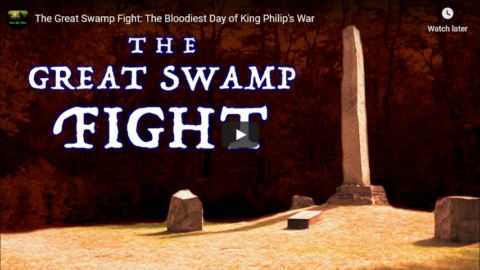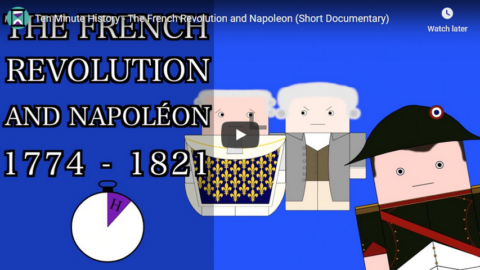Atun-Shei Films
Published 6 Oct 2020In December 1675, in the midst of King Philip’s War, an army of Puritan colonists made a preemptive strike against the neutral Narragansett tribe. Their desperate battle in the snowy wilderness of Rhode Island became a touchstone in the cultural lore of Anglo New England, while the subsequent massacre would go down as the darkest, most tragic event in Narragansett history.
Support Atun-Shei Films on Patreon ► https://www.patreon.com/atunsheifilms
Leave a Tip via Paypal ► https://www.paypal.me/atunsheifilms (All donations made here will go toward the production of The Sudbury Devil, our historical feature film)
Buy Merch ► teespring.com/stores/atun-shei-films
#KingPhilipsWar #NewEngland #AmericanHistory
Original Music by Dillon DeRosa ► http://dillonderosa.com/
Reddit ► https://www.reddit.com/r/atunsheifilms
Twitter ► https://twitter.com/atun_shei~REFERENCES~
[1] Eric Schultz and Michael Tougias. King Philip’s War: The History and Legacy of America’s Forgotten Conflict (1999). The Countryman Press, Page 269
[2] Douglas Leach. Flintlock and Tomahawk: New England in King Philip’s War (1958). Parnassus Imprints, Page 58-62
[3] Leach, Page 112-117
[4] Schultz & Tougias, Page 246-247
[5] Schultz & Tougias, Page 247-255
[6] Leach, Page 127-129
[7] Schultz & Tougias, Page 259
[8] Leach, Page 129
[9] Leach, Page 148-149
[10] Joseph Dudley. Second Letter of Joseph Dudley (2001). Bigelow Society http://bigelowsociety.com/rod/battles…
[11] Schultz & Tougias, Page 260-261
[12] Leach, Page 130-131
[13] Benjamin Church. Entertaining Passages Relating to King Philip’s War, Tercentenary Edition (1975). Pequot Press, Page 95-102
[14] Schultz & Tougias, Page 264-265
[15] Leach, Page 131
[16] Church, Page 101
[17] “History – Perseverance.” Narragansett Indian Nation http://narragansettindiannation.org/h…
October 7, 2020
The Great Swamp Fight: The Bloodiest Day of King Philip’s War
Canada’s new documentary monoculture – many now “skew the truth by reinforcing the viewpoint du jour“
In The Line, Christina Clark explains why she’s no longer in the business of making documentaries in Canada:
Many of the stories now told through documentary skew the truth by reinforcing the viewpoint du jour. Interviews and scenes that break with the chosen narrative, that offer something other than a black-and-white approach to society and the complexities of humanity, happen off camera or end up on the editing room floor. This is all in an effort to promote diverse voices and the political opinions that allegedly support them. But when we lay claim to a singular viewpoint or dismiss a perspective because the creator’s or the subject’s skin tone or gender does not fit the narrative of inclusion, we are actually removing diversity from the storytelling equation. And what we’re left with are one-sided storylines that reinforce an echo chamber of virtue signalling.
I can no longer deny the dysfunctional approach to telling half-truths and undermining alternate viewpoints in my industry in the name of securing public funding for programming that fails to resonate with the public that is paying for it. Over the last year, I’ve been turning down contracts and finding an exit strategy. I’m pre-emptively cancelling myself.
Documentary was once considered Canada’s national art form. Part of our country’s success with the medium can be attributed to the creation of our National Film Board (NFB), established to “make and distribute films designed to help Canadians in all parts of Canada to understand the ways of living and the problems of Canadians in other parts.” The NFB was founded to provide public funding to storytellers to show us who we are, as a country, as citizens.
To secure public funding for a documentary film or program in Canada, producers typically need to have a broadcaster already signed on to the project. Then, they can apply to funds like the Canada Media Fund, Telefilm or Rogers. Without a broadcaster licence, you cannot apply for public funding. The criteria for licencing a film or television series has narrowed in recent years — not unlike the audiences these programs are targeting.
Take, for example, the Creative Relief Fund that the CBC put together during the early months of COVID to award $2 million in development and production funding for new projects, ranging from fiction and non-fiction television to documentary shorts to plays and podcasts. This was an enticing invitation for creators in lockdown. During this time, friends and colleagues of mine in the industry were messaging each other back and forth, offering feedback on each other’s ideas, as we were all intending to apply. These are some questions we all wondered aloud, in the safety of our private chats: “Do you think this story is diverse enough?” “This story might be too white …” “I don’t think the language is woke enough, do you think they’ll see the bigger story here?” That’s because many broadcasters have “Inclusion and Diversity Plans” that you have to fill out for your project, that track the racial and gender makeup of your crew and your interviewees. While it is not explicitly mandatory to accommodate broadcasters’ criteria for diversity, a lot of filmmakers already know before they even pitch an idea that their chances of getting greenlit are greater if they do.
Ten Minute History – The French Revolution and Napoleon
History Matters
Published 12 Sep 2016Twitter: https://twitter.com/Tenminhistory
Patreon: https://www.patreon.com/user?u=4973164This episode of Ten Minute History (like a documentary, only shorter) covers the French Revolution and the Napoleonic Wars from the beginning of King Louis XVI’s reign all the way to the death of Napoleon Bonaparte in 1821. The first half covers the life and death of Louis XVI during the events of the revolution, including the rise and fall of Robespierre and the Reign of Terror. The second half covers the rise of Napoleon, the Napoleonic Wars and the eventual allied victory over France.
Ten Minute History is a series of short, ten minute animated narrative documentaries that are designed as revision refreshers or simple introductions to a topic. Please note that these are not meant to be comprehensive and there’s a lot of stuff I couldn’t fit into the episodes that I would have liked to. Thank you for watching, though, it’s always appreciated.
QotD: The gullible generation
World War II, which I have described (in The Probability Broach) as a struggle between competing brands of fascism, was much the same thing. For the beleaguered people of Europe, it meant being forced to choose between Adolf Hitler and Josef Stalin. Would you rather be shot or gassed?
For Americans, it meant looking for protection by a political regime so grossly and criminally corrupt that future historians will shake their heads, wondering how an entire people could be such suckers. “The Greatest Generation”, that miserable collectivist mouthpiece Tom Brokaw has called them. Looking back over what my father told me of his life, how his family suffered in the government-caused Great Depression, how he and his comrades risked unspeakable danger in the war, and how he became a prisoner in Germany — all to aggrandize the virtual godhood of Franklin Delano Roosevelt — I call them “The Gullible Generation”.
On the other hand, people loved the Roosevelt Administration so much that they passed a Constitutional amendment to make sure that no sonofabitch could ever be elected to more than two Presidential terms again.
World War II gave government complete, dictatorial control of American society, control of industry, control of communications, control of the economy, control that Roosevelt had desperately lusted after before the war, but failed to achieve. If anyone objected, or insisted on his rights under the Constitution, all the other side had to say was, “Don’t you know there’s a war on?”
The government enjoyed that level of control. Once the war was won, and people looked forward to a period of peace, the government plunged us into the Korean War, Vietnam, and an increasing number of undeclared and stupid conflicts in order to retain its power. “Don’t you know there’s a war on?” never worked quite as well as it had to shut dissenters up, but it’s clear that this scam will go on and on and on until something drastic is done to stop it.
L. Neil Smith, “The Deep State”, Libertarian Enterprise, 2019-04-14.






